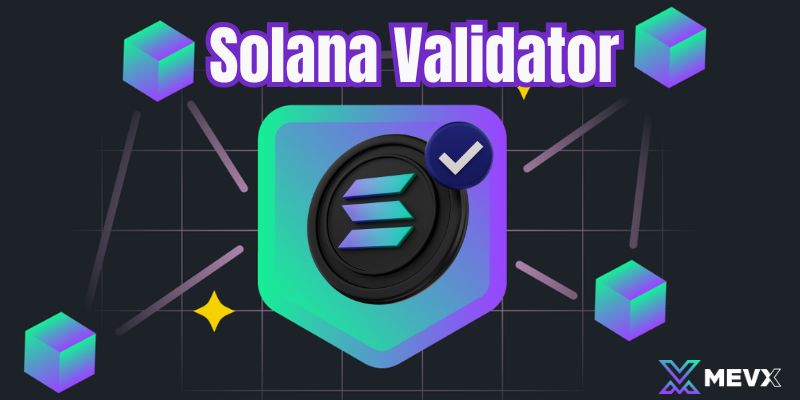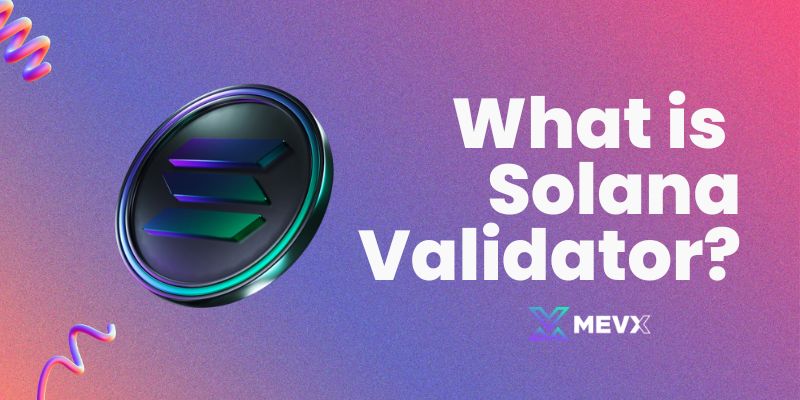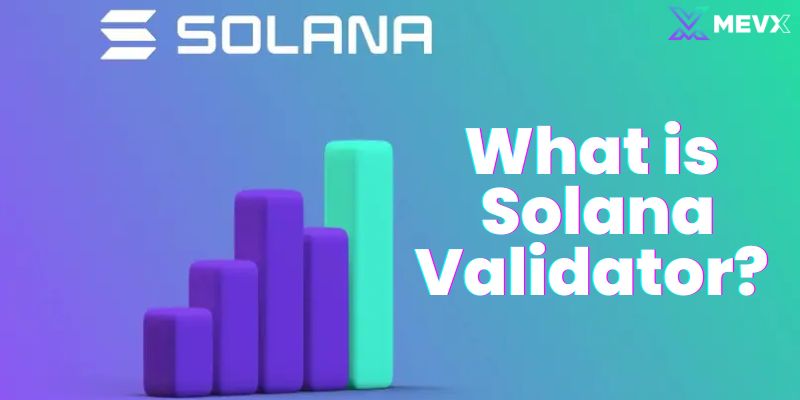What is Solana Validator? Solana Validators are crucial participants in the Solana blockchain, responsible for validating transactions, securing the network, and maintaining decentralization. In this article, we’ll explore the role of Solana Validators, how they contribute to the network’s growth, and why they are key to shaping the future of blockchain technology.
What is Solana Validator?
A Solana Validator is a node in the Solana blockchain that is responsible for validating transactions and ensuring that new blocks are added to the blockchain in a secure and decentralized manner. Validators in the Solana ecosystem are crucial participants in maintaining the network’s consensus, which is essential for ensuring the correctness and reliability of the blockchain.
Unlike other blockchain networks that use Proof of Work (PoW) or similar algorithms, Solana uses a combination of Proof of History (PoH) and Proof of Stake (PoS). These mechanisms allow Solana to achieve high throughput and low transaction costs while still maintaining security and decentralization.
Validators in Solana’s network do more than just verify transactions—they are actively involved in the process of block production and the consensus protocol that ensures only valid transactions are included in the blockchain.

The Role of Solana Validators in the Consensus Process
The Solana blockchain utilizes the Proof of History (PoH) consensus mechanism, which is distinct from the Proof of Work or Proof of Stake models used by other blockchains. What is Solana Validator in this context? Validators are responsible for verifying the accuracy of transactions and maintaining the integrity of the blockchain. They achieve this by:
Transaction Validation
Validators examine the transactions sent to the Solana network and ensure they meet certain criteria. This includes verifying digital signatures, checking transaction integrity, and ensuring that the sender has enough balance to carry out the transaction. This process is crucial for preventing fraudulent activity, such as double-spending.
Block Production
Once the transactions are validated, the Solana Validator produces new blocks containing these transactions. These blocks are then appended to the Solana blockchain, creating a transparent, immutable record. The process is highly efficient, with Solana being one of the fastest blockchains in the world, capable of processing over 65,000 transactions per second (TPS).
Proof of History (PoH)
One of the most innovative aspects of the Solana blockchain is its use of Proof of History. PoH acts as a cryptographic timestamp for transactions, enabling validators to validate transactions in a secure and time-efficient manner. This mechanism provides a historical record of events that is verifiable, reducing the need for complex synchronization among validators.
Consensus Participation
Validators also participate in the consensus process by voting on the validity of the blocks created by other validators. This voting system ensures that only valid blocks are added to the blockchain, and once a block receives a sufficient number of votes, it is confirmed and added to the Solana ledger.

How Solana Validators Contribute to the Future of Blockchain
Validators play a pivotal role in shaping the future of the Solana blockchain. They are not only responsible for the day-to-day operations of the network, but their involvement has a far-reaching impact on Solana’s scalability, security, and decentralization. Here are some ways Solana Validators help shape the future:
Scalability and Speed
Solana is known for its high throughput and low latency. The combination of PoH and PoS enables Solana Validators to process thousands of transactions per second. This capability is critical as blockchain technology continues to grow, and demand for fast, efficient networks increases. Solana’s validators ensure that the blockchain can handle this growth without compromising on speed or security.
With Solana Validators contributing to the validation process, the network can support decentralized applications (dApps) that require high-speed transactions, making it a strong contender for the future of blockchain applications, including decentralized finance (DeFi), gaming, and non-fungible tokens (NFTs).
Security and Trust
The decentralization of the network is enhanced by the global distribution of Solana Validators. Unlike centralized systems, Solana operates on a distributed network where validators are spread across different regions. This reduces the risk of a single point of failure, making the network more resistant to attacks and censorship.
As the blockchain space grows, the importance of trustless and secure networks becomes even more critical. Solana Validators ensure that the Solana blockchain remains a secure platform for users to conduct transactions and interact with decentralized applications.
Incentivizing Participation
One of the driving factors behind the success of Solana Validators is the reward system. Validators are incentivized to perform their duties honestly and efficiently through SOL token rewards. The higher the amount of SOL staked with a validator, the more likely they are to be chosen to validate transactions and produce blocks.
These rewards not only encourage more participants to join the network but also help decentralize the validation process. A wide range of participants strengthens the network’s security and decentralization, ensuring its growth and sustainability in the future.
Decentralization and Network Growth
Solana Validators help ensure that the network remains decentralized. The more validators there are, the more robust and resilient the network becomes. This decentralization is critical for the long-term sustainability of blockchain networks, as it ensures no single entity has full control over the platform.
As Solana continues to grow, the number of validators will increase, further decentralizing the network and allowing for more secure and transparent blockchain transactions.
Becoming a Solana Validator: A Step Towards Shaping the Future
For those interested in becoming Solana Validators, the process involves several steps. Here’s a brief overview of how to get started:
Hardware and Software Requirements
To run a validator, you need high-performance hardware, including a powerful CPU, sufficient RAM, storage, and a fast internet connection. Solana’s requirements are more demanding than some other blockchains due to the high transaction throughput.
Staking SOL Tokens
Validators must stake SOL tokens to participate in the consensus process. Staking SOL tokens ensures validators have skin in the game, as they can lose their staked tokens if they fail to operate the node correctly.
Running the Node
Once your hardware and software are set up, you’ll need to run the validator node and begin validating transactions. This process requires regular maintenance and monitoring to ensure optimal performance.
Earning Rewards
Validators earn rewards in the form of SOL tokens for their work in securing and validating the network. These rewards are distributed based on the amount of SOL staked with the validator and the validator’s overall performance.

Future Trends and the Role of Solana Validators
The role of Solana Validators will continue to evolve as Solana grows and the blockchain industry as a whole matures. As the demand for high-performance blockchains increases, the role of validators in ensuring scalability, security, and decentralization will become even more important.
Validators will likely have a growing influence on network governance, with some proposing and voting on protocol upgrades and changes to the Solana network. This evolving responsibility reflects the increasing importance of validators in shaping the future of Solana and the broader blockchain ecosystem.
What is Solana Validator? Solana Validators are essential participants in the Solana blockchain, playing a critical role in transaction validation, block production, and network consensus. Through their work, validators ensure that the Solana blockchain remains fast, secure, and decentralized.
As the blockchain ecosystem continues to evolve, Solana Validators will remain at the forefront of shaping the future of decentralized finance, Web3, and blockchain technologies. By incentivizing participation, ensuring scalability, and supporting the growth of decentralized applications, validators are integral to Solana’s success and the broader blockchain revolution.
Becoming a Solana Validator or supporting one is an exciting opportunity to contribute to the future of blockchain technology. If you’re looking to get involved in Solana’s growth or want to explore staking opportunities, Solana Validators are an essential part of the process—helping to shape the future of a decentralized and blockchain-powered world.
